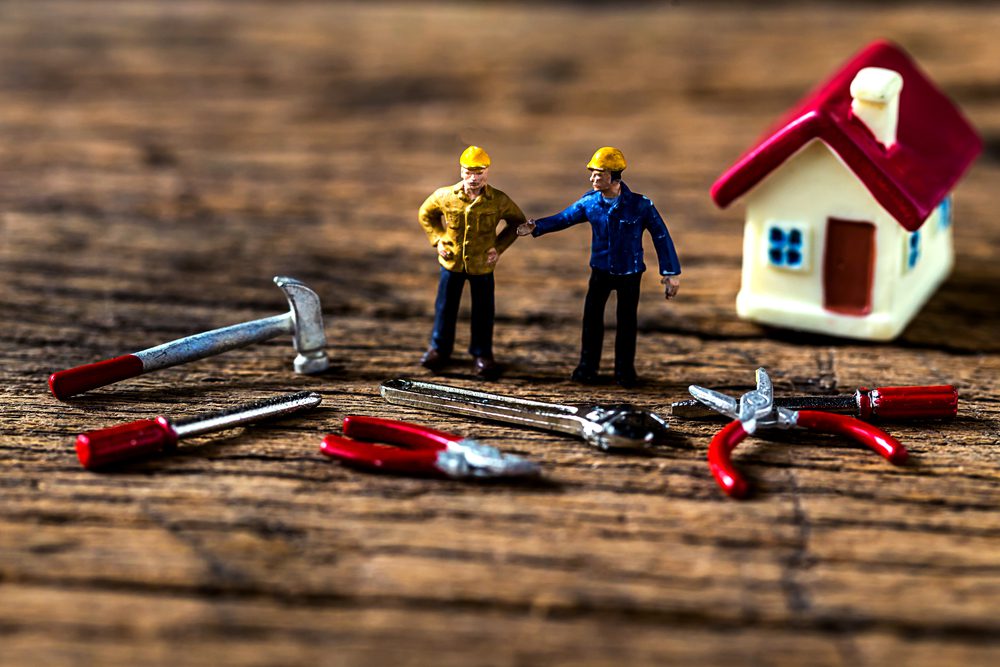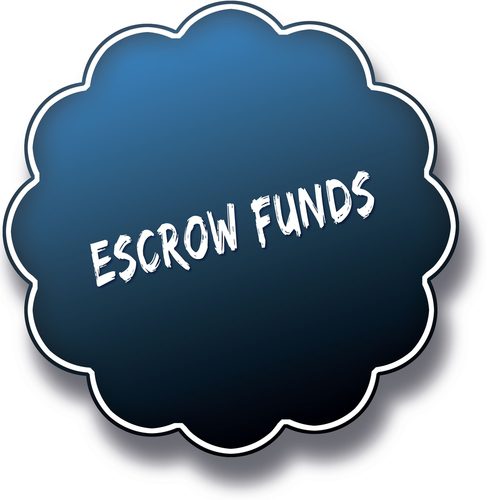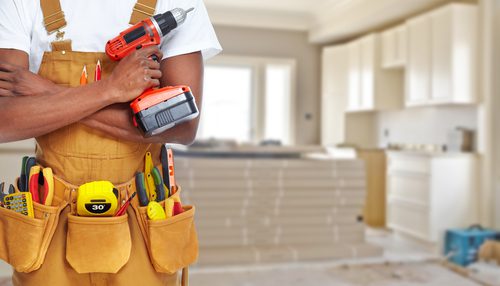Lori Ballen, the owner of this website, benefits from purchases made through her affiliate links.
 When a property needs repairs, sellers may not initially want to make the needed repairs prior to closing. Additionally, mortgage lenders sometimes hold back a portion of the loan allocated for specific projects during new construction or improvements to an existing home.
When a property needs repairs, sellers may not initially want to make the needed repairs prior to closing. Additionally, mortgage lenders sometimes hold back a portion of the loan allocated for specific projects during new construction or improvements to an existing home.
An escrow holdback allows buyers, mortgage lenders as well as appraisers to have a means of making sure that a home is safe and habitable. To better understand escrow holdbacks and to determine whether it is the right decision for your particular situation, you have to know the answer to several questions.
What exactly is an escrow holdback and why is it done?
Escrow holdbacks take place when the buyer, and in some cases the lender, holds back funds at closing to cover costs of repairs needed to the property. SFGATE Home Guides explains that while sellers are sometimes reluctant, or perhaps unable, to pay for necessary repairs or improvements to a home prior to the closing, buyers may also not have the desire or the means to “Pay for work on a home he has yet to call his own.”
It is not uncommon in real estate transactions for a buyer to make the demand that the seller make repairs.
The seller does not receive all proceeds of the sale of the property, specifically, the amount in escrow, until completion of the designated repairs.
How do appraisers get involved?
In order for an escrow holdback to take place, the appraiser typically brings the necessary repairs to light during the appraisal process. CMG gives an example of an escrow holdback allowance being when the appraisal is completed “subject to” the repairs or alterations being made.
Additionally, after repairs are made, funds are not automatically released. The appraiser conducts another appraisal to ensure the safety and habitability of the property.
Who qualifies for escrow holdbacks?
Everyone does not qualify for an escrow holdback. Many lenders refuse to establish escrow holdback for a refinance transaction. For example, CMG Financial specifically states, “Under no circumstances will CMG consider an escrow holdback on a refinance transaction.”
Additionally, when a buyer purchases a foreclosed home from the Department of Housing and Urban Development (HUD), using an FHA-backed loan with escrow holdbacks, the property repair needs cannot exceed $5000. Unlike in some other situations, the buyer can live in the home while repairs are being made, as long as what SFGATE refers to as “Incidental repairs” is being made.
What is included and excluded?
 It is crucial to understand what is included and what is not permitted as reason for escrow holdbacks. This is because every repair situation does not qualify for holdbacks.
It is crucial to understand what is included and what is not permitted as reason for escrow holdbacks. This is because every repair situation does not qualify for holdbacks.
Optional cosmetic repairs or upgrades, such as installation of or repair to a swimming pool, are not included in the types of repairs that can be submitted for the escrow holdback process. Some necessary repairs, such as major roofing repairs, structural or foundation repairs and damage caused by termites are also generally excluded. Partially completed renovations or additions are also not permitted as eligible escrow holdback repairs. However, many types of repairs do qualify, such as:
- Repair or replacement of damaged, broken or unsafe windows or screens
- Replacement of rotted wood, not caused by termites
- Exterior painting
- Minor plumbing leaks or other minor plumbing repairs
Buyers need to make sure that repairs do qualify for escrow holdbacks if this is the route a buyer wants to take to ultimately get the property they really want.
Mortgage lenders have the ability to hold a portion of the loan in escrow holdback on new construction loans until completion of work on certain specified projects. The new construction holdback cannot include repairs or improvements otherwise deemed ineligible.
How are escrow holdbacks approved?
Closing on a home in need of repairs is potentially a risky move. SFGATE points out that:
Home seller liability for repairs after a home’s sale closing is complicated, though, and liability may or may not exist,”- in Are the Sellers of a House Liable for Repairs After the Closing?
 Although a seller may fail to make repairs prior to closing and the buyer subsequently discovers repairs that the seller failed to make does not mean that the seller automatically has any further liability. One mistake that buyers sometimes make is waving post-repair home inspections after the seller claims to have made the repairs.
Although a seller may fail to make repairs prior to closing and the buyer subsequently discovers repairs that the seller failed to make does not mean that the seller automatically has any further liability. One mistake that buyers sometimes make is waving post-repair home inspections after the seller claims to have made the repairs.
One way of ensuring that the seller does complete the repairs is by holding back the funds via escrow holdback.
The funds in escrow are held back until after the specified repairs are made and documentation provided. Escrow holdbacks are not approved for long periods of time.
Another detail about escrow holdbacks is that they are decided on a case-by-case basis. Therefore just because a buyer wants to enter into an escrow holdback agreement does not automatically mean that the lenders approve holding funds for repairs through escrow holdback based solely on request.
What specific requirements are involved before making repairs?
Submitting documentation is a part of the process for escrow holdbacks requests. Examples of required documentation include:
An itemized list of all repairs
Make a detailed, itemized listing of repairs to be made that potentially qualifies, remembering that repairs typically cannot exceed $5,000
Bids for repairs
A third party, meaning one without a direct interest in the property, provides an estimated cost of repairs. An appraiser, an independent contractor, a professional painter are some examples of acceptable licensed third parties eligible to provide documentation regarding estimated repair costs. Typically, a minimum of two bids from different licensed contractors are required. A decision is then made regarding which contractor completes the repairs.
Estimated completion date
 It is crucial that all parties adhere to the limitations on completion dates. For example, The Mortgage Porter explains that they, “Typically allow up to 15 days for the work to be finished” and require invoices that prove full payment for repairs. CMG, on the other hand, allows up to 120 days.
It is crucial that all parties adhere to the limitations on completion dates. For example, The Mortgage Porter explains that they, “Typically allow up to 15 days for the work to be finished” and require invoices that prove full payment for repairs. CMG, on the other hand, allows up to 120 days.
Some lenders allow two weeks after closing for completion of the repairs. Therefore, sellers and buyers must have a clear understanding on time limits associated with completion dates.
There is an exception to note. On conventional and FHA loans, there is an inclement weather exception, which potentially allows for up to an additional 150 days.
Fully-completed escrow holdback agreement
As with any other type of enforceable document, it is crucial that the agreement is fully completed.
Party supplying the escrow funds
The agreement lists the borrower or seller as the party financially responsible for making the repairs.
The agreement may also contain other requirements, including repair requirements under FHA loans or the VA escrow holdback agreements.
When are escrow holdback funds released?
The property must be deemed safe and habitable for occupancy. After a new appraisal, the appraiser provides the lender with a report before approval of release of the funds in escrow holdback.
After closure of the escrow holdback account, the mortgagee completes an Escrow Closeout Certification in the case of an FHA loan.
The seller does not receive all funds held until completion of repairs listed in the escrow holdback agreement.
Click on the price or feature of the Real Estate You would like to see. You'll be taken to a page of MLS listings just as you requested. When you see something you like, Call 1-800-805-8354.| Shop All Las Vegas Homes For Sale |





